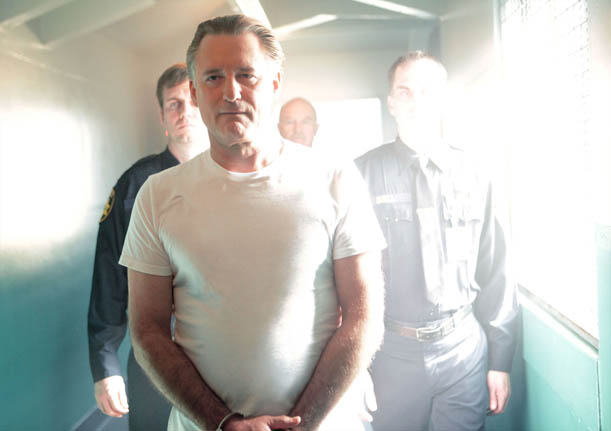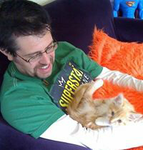Torchwood: Bill Pullman
None
Exclusive interview with the renowned actor who plays Miracle Day ’s uncompromisingly evil Oswald Danes

When news first surfaced that Torchwood: Miracle Day ’s main bad guy would be a child murderer, Oswald Danes, who survives execution because of Miracle Day (the day when people stop dying), more than a few eyebrows were raised. Was it tasteless, or morally dubious to feature such a character in a science fiction action series? A series that’s a spin-off from the family entertainment phenomenon that is Doctor Who . But as anybody who’d seen Children Of Earth knew, Torchwood had moved on a long way, and series creator Russell T Davies wasn’t afraid to tackle to dark side of humanity in surprising and thought-provoking ways.
Nevertheless, it was going to take someone with serious acting chops to pull off a character like Danes. So that’s who the show’s executive producers – Russell T Davies and Julie Gardner – called on: Bill Pullman. Although still most remembered by genre fans as the president in Independence Day , Pullman is no stranger to more twisted roles in films such as Lost Highway and The Guilty .
When SFX calls him up for an exclusive chat about Miracle Day , he immediately jokes that what we’ve interrupted him in the midst of a very un-sci-fi occupation: “I just came out of the fields. I have a ranch with my brother here in Montana. It’s just starting into haying season. I feel very far from sci-fi.”
What was your first reaction when you read the script?
“I got sent the five episodes of Children Of Earth and three scripts. I was halfway through the second script when I rang my agent and said, ‘I wanna do it!’ I hadn’t even seen Children Of Earth yet. I just thought that the scripts were so good, and the tone and everything was exactly the kind of thing that’s my idea something that crosses a lot of boundaries and aims for a larger audience without dumbing it down.”
Is it a bit of a back-handed compliment being asked to play a child murderer?
Get sneak previews, exclusive competitions and details of special events each month!
“Well, you know, I have played a bunch of troubled characters before, so I was kinda prepared for it. I’m not shy of that kind of stuff. Other people can worry more about that sort of thing, but I don’t. It was just a well written part. I don’t think I could do a child murderer just for a child murderer’s sake, you know. And in a kind of way, that’s just the condition he begins with, and then because of circumstances, he has to extend beyond that. Then it’s a question of whether he’s carrying too much baggage to be able to do that.”
Yes, because although he starts out – for want of a better shorthand – as a Hannibal Lecter character, he develops into a Billy Graham, or maybe messianic character, doesn’t he?
“That’s exactly it. Either by fluke, or coincidence, or divine destiny, his failure to die becomes the pivot for a whole world that has changed. He becomes a global celebrity, in a way. People begin to listen to him and he has a message they want to hear. He’s an intelligent guy, so he’s recognising opportunities, and sensing all the layers of threat that could come and throw him off his throne. He recognises all these powers that want to co-opt him. He has to make alliances with difficult people that he is not comfortable with. So you get a look at that kind of intricacies of power.”
How do you make the transition from playing a character who is reviled to one who is adored ? Was it all there in the writing or was it a lot down to way you acted it?
“Russell gave it the broad strokes, but when we started he wasn’t sure quite how the journey would be. So in a way he gave the broad strokes but he was kinda looking to me to make those big arc choices. That was part of what was intriguing about the part, because I don’t often get to do a 10-part series.”
So did you enjoy being given more of a chance to build the character?
“Yeah. Part of it was this fantastic collaboration with Russell, and the other writers. There were some very good writers on it – and I’m sure Russell gives a lot of credit to the other writers – but when it came to Oswald, it was maybe more something he knew about – in terms of how he saw the character developing – than other people. So we were shaping scenes, and working out conditions in rough drafts and first drafts, and then later drafts. For me, Russell is one of the most satisfying people to work with. He’s very intelligent. He’s very confident. He’s very collaborative. Whatever you say, he can process it, and then he puts it in Russell T Davies speak – ha ha.”
Are there any big speeches to rival your famous one in Independence Day ?
“Hahahahaha! I don’t know. You do these things and you never know quite how they’re going to come across. I remember with Independence Day it felt to me like just another scene, you know? I remember, we were night shooting, about 3am, and Dean Devlin, the producer, came in, and he said that he really wanted to put that speech together. Because they wanted to keep the title Independence Day , and the studio wanted to change it to Doomsday or something like that. So they cut together this speech to take to Fox, because it ends with, ‘Today is our Independence Day.’ And Dean was like, ‘They can’t change the title if they buy this whole scene.’ And when he showed me the scene, I was, ‘Oh wow, that is kicking butt, that speech!’ But I never sensed it would go down the way it went down. So there may be a speech to match it in this. I couldn’t say.”
When you’re playing such an evil character as Oswald, is it hard to switch off after work?
“Not hard to switch off, no. But it is buzzing around in me all the time, because it’s like a stick you’re whittling on. When you sit back in repose, things about it, or moments coming up, or moments you’ve done before, keep reprocessing in your brain. It’s never far away, but at the same time I’m not at the mercy of it. I think I was most aware of it when I would first come out of an intense scene, and you can sense that the crew is paying more attention than they normally do. I get a little self-conscious at a moment like that when I have to segue back into the guy who has to go over and get a coffee from craft services.”
How did shooting a British/American co-production compare to your previous TV and film experiences?
“It was a very good atmosphere set. They were interested in everybody’s work. There was a lot of feedback for everybody. Eve Myles, John, Kai Owen. It starts with Julie Gardner and Russell giving the crew a lot more support and a lot of affirmation. So it feels like they’ve got something important that they all want to accomplish together. It felt very very good that way.”
Were the notoriously boisterous John Barrowman and Eve Myles on best behaviour around you?
“Well, I think, in a certain way, because Oswald is different to other characters they were running into, they were getting into aspects of themselves, different to other moments where there was more panache. So they were probably more subdued and focussed in the scenes that I’m in because of the nature of the material we were dealing with. But I did see a lot of evidence of mischief making sure. There were times when we were doing little running scenes or things like that, and definitely he seems to have a good barometer of when everybody’s spirits need a little lift. He’s extremely capable of doing that and delivering a performance. I’m not quite that way, but it’s nice having somebody doing it on set.”
In the first couple of episodes your plot line is pretty much self contained. When does your storyline merge with the Torchwood storyline?
“By the third episode they start to fold into each other.”
And you spend a lot of time with Lauren Ambrose, who plays Oswald’s PR, Jilly Kitzinger.
“She’s fantastic. I knew her work from the theatre as well. She’s an accomplished stage actress. And their relationship is really curiously written. I came away from the series even more impressed with her.”
Sounds like you had great fun?
“Oh yeah. I know when you promote these things everybody says it’s the greatest thing since sliced bread, but this really is a highlight of my career.”

Dave is a TV and film journalist who specializes in the science fiction and fantasy genres. He's written books about film posters and post-apocalypses, alongside writing for SFX Magazine for many years.


